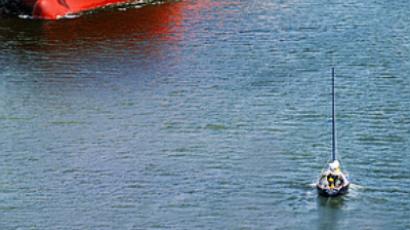Missing ship feared hijacked by pirates
Despite a series of reported sightings, the location of a Russian-crewed cargo vessel missing for almost two weeks is still not known.
The Russian Navy says that its ships are continuing to search for the Russian-crewed ship missing in the Atlantic since August 1. "The Russian Navy ships continue to carry out the [search] task in the Atlantic, following set courses and searching for the Arctic Sea vessel," its statement said.
Earlier, reports suggested that Russian ship Ladny is following a vessel that could be the Russian-crewed missing vessel. The information, however, have been refuted by the Russian Fleet.
”The news” followed another unconfirmed report that unnamed ship that resembles the “Arctic Sea” has been spotted in the Spanish port of San Sebastian. Spanish fleet authorities refuted the information either.
While the search is going on in the Atlantic for the missing “Arctic Sea” ship with a Russian crew onboard, speculations are raging in the media over if and why the vessel could be seized by pirates.
On Wednesday Interpol has passed the shocking information to all its member states that the “Arctic Sea” was seized by pirates, according to Itar-Tass news agency’s London department – though the Russian Central Interpol Bureau says they haven’t received any information concerning the possible seizure of the “Arctic Sea” from the General Secretariat of Interpol, according to the Russian department of Itar-Tass.
They add that, according to a pilot of a Portuguese coastal patrol aircraft, he saw the “Arctic Sea” on August 2 while patrolling the Atlantic in latitude of the city of Porto.
After that all traces of the ship disappear, as there are “no indications that it would have passed Gibraltar”, a Spanish coastguard official told the Independent.
The “Arctic Sea”, a Maltese-registered vessel heading to Algeria with a cargo of timber, was last recorded on the AIS Live ship tracking system off the coast of Brest, northern France, at 1.29am on July 30. At that moment the ship was in the western part of the Bay of Biscay.
The ship was due to arrive in the Algerian port of Bejaia on August 4 – which it never did.
The Russian-based company that operates the Arctic Sea says that the crew is highly professional and the captain is known for his experience and discipline.
An incident which recently happened to the ship in the Baltic Sea has aroused the suspicion that the ship has been hijacked.
On July 24, masked men claiming to be police stopped the “Arctic Sea”, tied up the crew and searched the vessel.
The crew reported the incident to the Swedish police and provided them with written testimonies of what happened and the photographs of the crew members’ injuries, three of whom were beaten up by the attackers.
Nevertheless the Arctic sea continued its journey to Africa, contacting British and French coast guards as it passed through the English Channel.
According to the “Arctic Sea” crew’s report, after the 12-hour ordeal, the masked men left and the ship resumed its voyage – which is now doubted.
The British coastguards who were the last to have communicated with the ship on radio, on July 29 as the “Arctic Sea” passed along the English Channel, now suggest that the person speaking to them was “either a hijacker or a member of the crew with a gun pointed at his head”, the Independent says.
“We heard from this ship, not knowing it had been hijacked, on 29 July at 5.30 in the morning [local time]. They said they had 15 crew on board and they were going from Jacobstad [in Finland] to Bejaia,” Mark Clark of the UK's Maritime and Coastguard Agency (MCA) said.
“It wasn't until later that we had a report from the Zeebrugge [Belgian] police to say it had been hijacked off the coast of Sweden. The contact we had suggested everything was OK on the ship but we don't know if we were talking to a hijacker or a genuine crew member with a gun at his head,” Mark Clark added.
No distress signal has been passed by the ship since then, and the crew are believed to have twice made contact later – with investigators in Stockholm on July 31 and with Russia’s Archangelsk, where the relatives of the crew live and the ship’s operator is located, on August 1, Russian Vesti TV channel says.
The majority of experts rule out the possibility of a random pirate attack on the ship for ransom, citing its cargo as the likely target.
That cargo, they argue, had to be something illegal – such as drugs or weapons – and the attack must have been set up by an organized force. Others suggest the ship was attacked by pirates twice – first in the Baltic, and then off the Portuguese coast.
Mikhail Voytenko, editor-in-chief of the Russian maritime bulletin Sovfrakht, is among those who believe it was a well-organized seizure.
“There are three possibilities of what could have happened to the ship. The first one, Lord forbid, is that the vessel has been already sent to the bottom after the [secret] cargo was taken off it – the cargo because of which everything started. What that cargo has been – we don’t know and I’m afraid will never know now. The second possibility is that the ship is sailing somewhere at the moment with its crew staring down gun-barrels – somewhere it will be unloaded. And the third is that the cargo was reloaded to another ship right there at sea and the “Arctic Sea” ship was abandoned. So now it could be adrift with the crew locked inside and in urgent need of help,” Voytenko said.
Meanwhile, journalist Natalia Gracheva – the first to raise the alarm about the missing ship – also believes its disappearance was down to a carefully-planned criminal attack.
“It is definitely a criminal act performed for gain. They might now want either to sell the cargo or demand money for the release of the crew or the cargo,” Gracheva says. “It is most probably a continuation of the attack that took place in Sweden. It’s very doubtful that after 12 hours the crew was freed and the attackers left the vessel. It is possible that the offenders never left the ship. The versions about a random attack on a vulnerable vessel should be dismissed. It seems the attackers knew the ship well and were hunting for it specifically. It's also impossible that the ship would sink – we would see piles of timber. And if there was an explosion, it would have been recorded. The ship is thought to be heading to Africa now, since it will be easier for the hijackers to sell the cargo in countries with weaker controls.”
Both the relatives of the crew and the Finnish owner of the ship have asked the Russian authorities to help trace the missing vessel, and Russian President Dmitry Medvedev has ordered Defense Minister Anatoly Serdyukov to do everything possible to find the ship.
“The Russian Defense Ministry has instructed the Russian Navy to search for the “Arctic Sea” vessel in the presumed area of its location. The Navy intends to cooperate with the Russian Foreign Ministry, Emergency Ministry and the ship owners, as well as with the relevant international organizations. The Russian Navy ships located in the Atlantic and all possible tracking systems, including space, are involved as well,” the Defense Minister’s press secretary Aleksey Kuznetsov told RT.
Russian authorities have also expressed their concern over the fate of 15 Russian citizens on board of the missing ship.
According to Igor Lyakin- Frolov of the Russian Foreign Ministry, the ministry is doing its best to clarify the situation and to solve the problem. ”For this purpose ministry actively works with all concerned countries and their competent authorities,” he said.
Five Russian Black Sea Fleet warships have set out for the search. The guided missile frigate Ladny was leading the fleet as they passed the Strait of Gibraltar and into the Atlantic Ocean early on Thursday.
Also, a large-scale international search operation is going on in the Atlantic, with its headquarters in Malta.
Now, everyone is counting on the vessel’s need to refuel – and therefore, the need to head for a port. If that fails, the Arctic Sea could well become a ghost ship of the 21st Century.













